Since July we've had an intense rainy season but it seems to be ending now, overall good for crops and livestock but bad for unprepared urban infrastructure with recurrent flooding and damage. Temperatures and humidity are up to the 30s and 80s and power and water cuts are frequent and long. We have now installed an “electricity robot” at home: a charger/inverter wired to a large car battery (basically like a large UPS for computers) so that we can enjoy the use of fans and laptops/internet/music for about 8 hours, regarlless of the SENELEC tantrums, and with whom we've had a clandestine hook up as their corrupt employees claim not to have electric meters to install (“but pay me something to not disconnect you”). For water we just fill up umpteen 10 liter water jugs stored in a spare room.
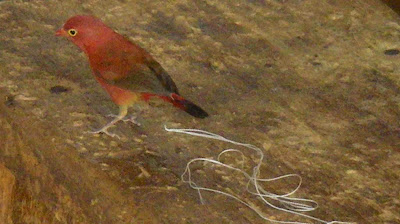
Bernard's first job with CRS finished at the end of July with the successful completion of the 3 year project to assist communities in Northern Senegal and Southern Mauritania hard hit by the locust plague of 2004 and to prepare the most vulnerable communities in Senegal against an outbreak of Avian Flu (there have been no cases in SN though there are large populations of migratory birds and neighboring countries have had outbreaks).
He was immediately recruited for a further 3 month consultancy by the CRS West Africa Regional Office as an itinerant rural development technical advisor to assist CRS country offices in francophone West Africa with developping new USAID funded projects to mitigate against the food price crisis. So far this has entailed assisting the offices in Senegal, Mali and Gambia (not francophone but logistically simple as it is surrounded by Senegal) to help poor farmers to improve their production of rainfed rice. The US Office for Foreign Disaster Assistance just requested more urgent proposals to assist those in most acute need in the 5 francophone west african sahelian countries (from Mauritania to Niger), thus another 12 day trip to Mopti, Mali, to research and pre-write a project to assist about 10,000 peri-urban squatters to re-locate and get access to more cropping land and develop more economic activities.
I have to say that, using generalities, Africa is poor because of its men but rich thanks to its women. Meetings with the women is always a serious but healthy laugh. Thus far, it's been more steep learning but with very competent and humorous colleagues. Scenery everywhere has been lush green with lots of millet growing, interspersed with groundnut (peanut), cowpea, maize and rice in swampy areas and herds of fat animals foraging. Bamako is surprisingly green and steamy, feeling more like Southeast Asia than the capital of Sahelian Mali, especially with the wide and overflowing Niger river (and its hippos).
Some work and travel impressions:
Farafenni, “upcountry” in the Gambia: very poor and not tourist friendly, no newspapers, AM/FM radio stations or Internet connection, only one guest house with mozzies and bedbugs and no idea what a “vegetable” is, plenty of grisstly meat bits but hard to find even bananas!
Visited the megalithic burial site of Wassu, dating from about AD 800, one of a few in this area.

The place is also full of wild birds, some very noisy!

Work involved distributing 50kg bags of urea fertiliser to 1,600 poor rice farmer women, sometimes in pouring rain. No men helped the women (sometimes older) to transport and lift the heavy bags. But they remained in good spirit and were appreciative of the gift to boost their own small rice production. Interestingly, rice cropping areas have severly decreased due to predation of hippos and warthogs (rice seedlings must taste like croissants to them).
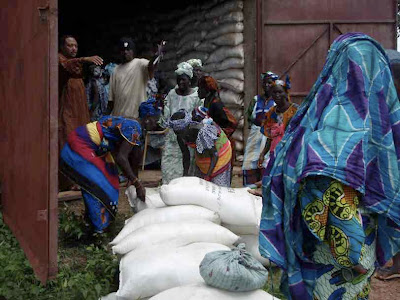 Also the whole of rice production is only women's work, from plowing, seeding, weeding, harvesting, storing, milling and cooking (no animal, no machine and no cash investment of any sort – seed, fertiliser, ploughing, treshing, etc.)! No wonder the yields are so low and harvesting can take a whole month. The main constraint is that the whole process is based on women managing their labour load (already substantial) and not on maximizing land or resource productivity, unlike most of Asia.
Also the whole of rice production is only women's work, from plowing, seeding, weeding, harvesting, storing, milling and cooking (no animal, no machine and no cash investment of any sort – seed, fertiliser, ploughing, treshing, etc.)! No wonder the yields are so low and harvesting can take a whole month. The main constraint is that the whole process is based on women managing their labour load (already substantial) and not on maximizing land or resource productivity, unlike most of Asia.Casamance: I could have got there by Paris city bus: the “Paris-Barbes to Senegal-Casamance”. Hard to imagine how that bus got there!
 Also steamy, green and lush with many water “features” but of the muddy kind.
Also steamy, green and lush with many water “features” but of the muddy kind.
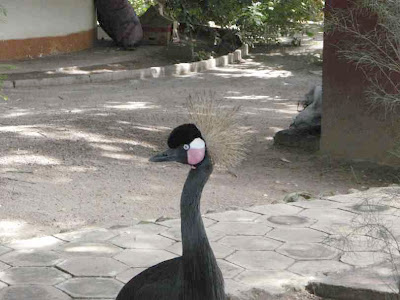 Local bird as a guest-house "pet"
Local bird as a guest-house "pet"Check out this nice site for some of the Gambian (and Casamance) wildlife: http://ksossehgallery.blogspot.com/
The harbor is very busy with many crowded contraptions and is surrounded by thriving market stalls and boatbuilders (they hand make each nail!).
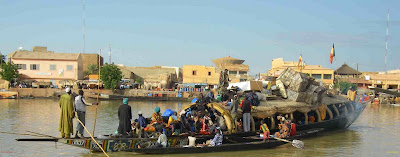
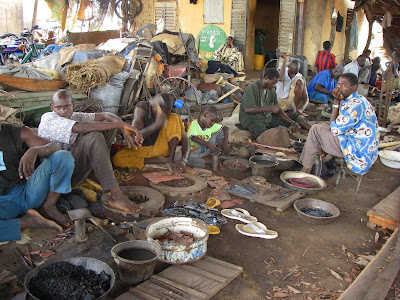
 You could reach Timbuktu, downriver, in 3 days by boat. I had a scurrying posse of colourful lizards around my feet at breakfast each morning, waiting to be fed corn flakes.
You could reach Timbuktu, downriver, in 3 days by boat. I had a scurrying posse of colourful lizards around my feet at breakfast each morning, waiting to be fed corn flakes. 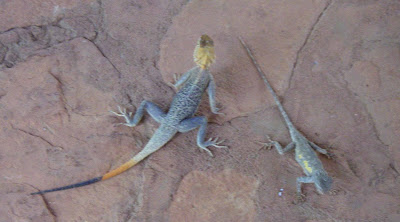
On the entertainment side, we have done a bit of sailing and continue swimming. Culturally, the rainy season is quiet as the expats go on holidays, it's hot and it's risky to hold any outdoor event but it's picking up again, we just saw some Senegal folk dancing, with a great drum band and an amazing African mask dancer on 6 foot giraffe skin decorated stilts – stunning. The kids shrieked and we almost did too.
Gina is about to start her next term of evening English classes for professionals and we now have a few potential end-of-year visitors.
The downside of living next to the unofficial “airport wildlife reserve” is that after each rain, despite our best efforts, we are invaded by all sorts of bugs and our window screens are artistically covered with “one use only” insect wings.
Best wishes to all for your autumn season while we head for dry and cooler weather. G&B&ZZs

